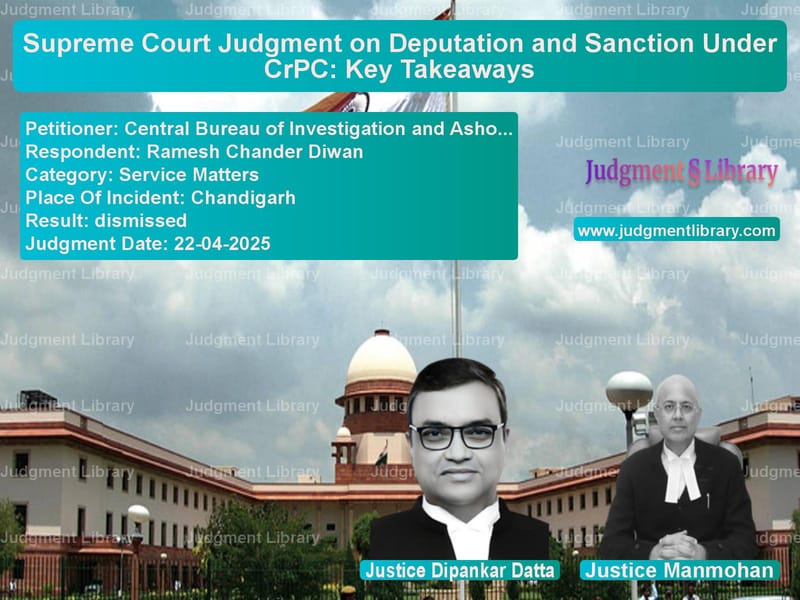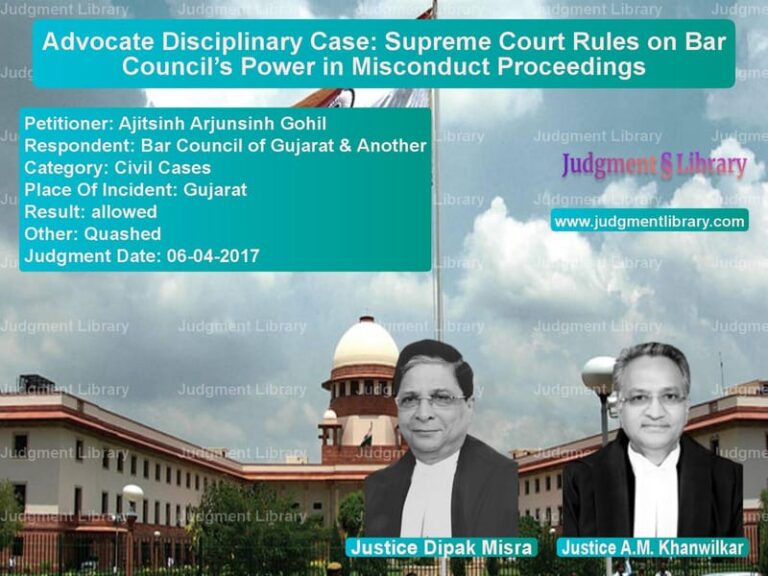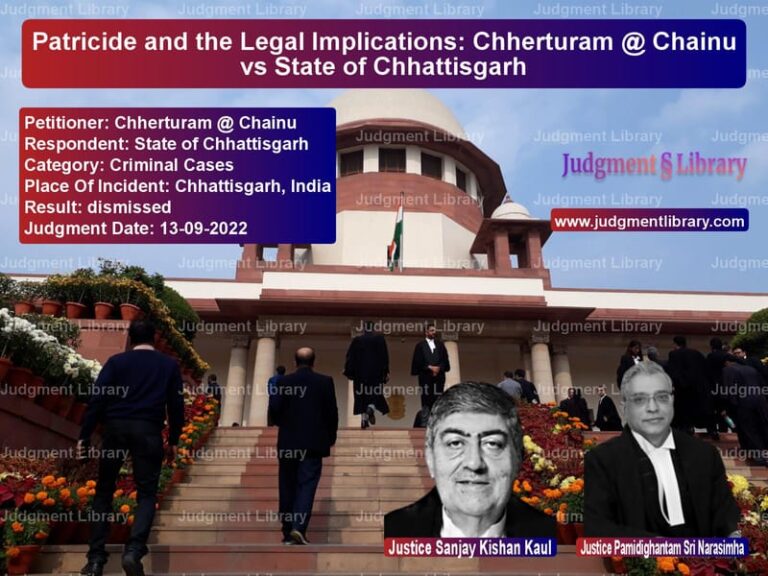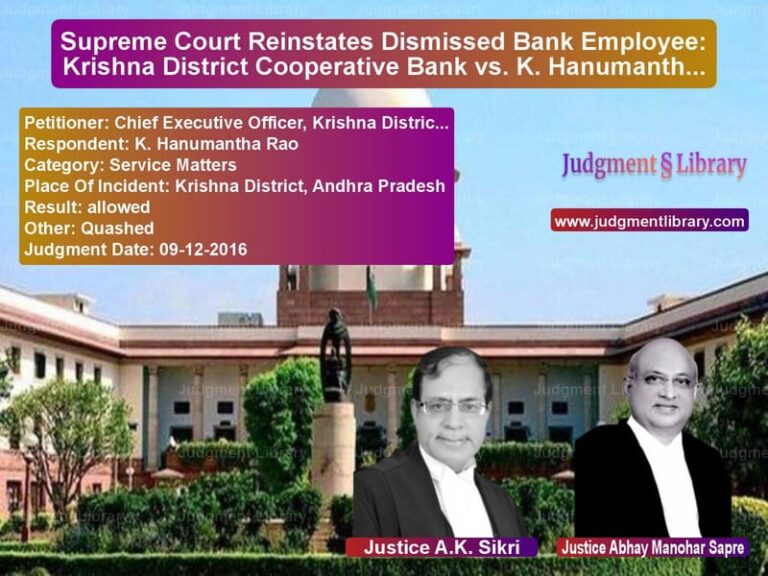Supreme Court Judgment on Deputation and Sanction Under CrPC: Key Takeaways
The Supreme Court of India recently delivered a significant judgment in the case of Central Bureau of Investigation vs. Ramesh Chander Diwan, along with a connected appeal by Ashok Kumar Manuja. The judgment, pronounced on April 22, 2025, by Justices Dipankar Datta and Manmohan, revolved around the interpretation of Section 197 of the Code of Criminal Procedure (CrPC) and its applicability to public servants on deputation. The case has far-reaching implications for the legal framework governing public servants and the necessity of sanction for their prosecution.
The dispute arose from an FIR registered on December 9, 2014, against Ramesh Chander Diwan, who was serving as the Executive Engineer, Public Health, Municipal Corporation, Chandigarh. The allegations included wrongful loss to the government exchequer exceeding Rs. 13.66 crore due to changes in the terms of a tender. The FIR invoked Sections 120B (criminal conspiracy) and 420 (cheating) of the Indian Penal Code (IPC) and Section 13(2) read with Section 13(1)(d) of the Prevention of Corruption Act, 1988.
The High Court of Punjab and Haryana had earlier partly allowed Diwan’s revision petition, discharging him for IPC offences due to the absence of sanction under Section 197, CrPC, but upheld the charges under the Prevention of Corruption Act. The CBI and the complainant, Ashok Kumar Manuja, appealed this decision before the Supreme Court.
Key Arguments by the Petitioners (CBI and Ashok Kumar Manuja)
Mr. Suryaprakash V. Raju, the Additional Solicitor General representing the CBI, argued that Diwan, while on deputation to the Municipal Corporation, Chandigarh, ceased to be a public servant under the Government of Punjab. He contended that Section 197, CrPC, which mandates sanction for prosecuting public servants, did not apply to Diwan in this context. Mr. Raju relied on several precedents, including S.S. Dhanoa v. Municipal Corporation Delhi and Mohd. Hadi Raja v. State of Bihar, to support his claim that deputationists are not entitled to the protection of Section 197, CrPC.
Key Arguments by the Respondent (Ramesh Chander Diwan)
Diwan’s defense centered on his continued status as a public servant under the Government of Punjab, despite his deputation. He emphasized that his appointment and disciplinary control remained with the Punjab government, and thus, sanction under Section 197, CrPC, was mandatory for his prosecution. He also sought protection under the amended provisions of Section 19(1) of the Prevention of Corruption Act, which extends the requirement of sanction to retired public servants.
Supreme Court’s Analysis and Decision
The Supreme Court meticulously examined the concept of deputation in public service law. Citing its earlier decisions in State of Punjab v. Inder Singh and Umapati Choudhary v. State of Bihar, the Court clarified that deputation involves a temporary assignment of an employee to another department without severing ties with the parent department. The Court noted that Diwan’s deputation to the Municipal Corporation, Chandigarh, did not alter his status as a public servant under the Government of Punjab, as his appointment and disciplinary control remained with the latter.
The Court further observed that Section 197, CrPC, is designed to protect public servants from frivolous prosecutions for acts performed in their official capacity. It emphasized that the provision applies only to those public servants whose appointing authority is the Central or State Government, as held in A. Sreenivasa Reddy v. Rakesh Sharma.
In its judgment, the Court stated: “We are of the considered opinion, having regard to the materials on record, that the respondent while rendering service for the State of Punjab as well as the administration of the Union Territory was a public servant covered by clause (a) of the 12th description in Section 21, IPC and despite his assignment on deputation to the Municipal Corporation, Chandigarh, he continued to remain a public servant for the purposes of sub-section (1) of Section 197, Cr. PC, being removable from office by an appropriate authority in the Government of Punjab and none else.”
The Court dismissed the appeals, upholding the High Court’s decision to discharge Diwan for IPC offences due to the lack of sanction. However, it clarified that the charges under the Prevention of Corruption Act would remain, as the amended provisions of Section 19(1) did not apply retrospectively to Diwan’s case.
Conclusion
This judgment reaffirms the legal principle that public servants on deputation retain their status under the parent department for the purpose of sanction under Section 197, CrPC. It underscores the importance of protecting public servants from undue harassment while ensuring accountability for corrupt practices. The decision provides clarity on the applicability of sanction requirements and serves as a guiding precedent for similar cases in the future.
Petitioner Name: Central Bureau of Investigation and Ashok Kumar Manuja.Respondent Name: Ramesh Chander Diwan.Judgment By: Justice Dipankar Datta, Justice Manmohan.Place Of Incident: Chandigarh.Judgment Date: 22-04-2025.Result: dismissed.
Don’t miss out on the full details! Download the complete judgment in PDF format below and gain valuable insights instantly!
Download Judgment: central-bureau-of-in-vs-ramesh-chander-diwan-supreme-court-of-india-judgment-dated-22-04-2025.pdf
Directly Download Judgment: Directly download this Judgment
See all petitions in Employment Disputes
See all petitions in Public Sector Employees
See all petitions in Disciplinary Proceedings
See all petitions in Judgment by Dipankar Datta
See all petitions in Judgment by Manmohan
See all petitions in dismissed
See all petitions in supreme court of India judgments April 2025
See all petitions in 2025 judgments
See all posts in Service Matters Category
See all allowed petitions in Service Matters Category
See all Dismissed petitions in Service Matters Category
See all partially allowed petitions in Service Matters Category







